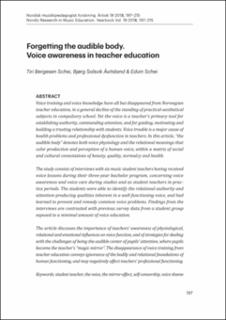| dc.description.abstract | ABSTRACT. -
Voice training and voice knowledge have all but disappeared from Norwegian teacher education, in a general decline of the standing of practical-aesthetical subjects in compulsory school. Yet the voice is a teacher’s primary tool for establishing authority, commanding attention, and for guiding, motivating and building a trusting relationship with students. Voice trouble is a major cause of health problems and professional dysfunction in teachers. In this article, “the audible body” denotes both voice physiology and the relational meanings that color production and perception of a human voice, within a matrix of social and cultural connotations of beauty, quality, normalcy and health.
The study consists of interviews with six music student teachers having received voice lessons during their three-year bachelor program, concerning voice awareness and voice care during studies and as student teachers in practice periods. The students were able to identify the relational authority and attention-producing qualities inherent in a well-functioning voice, and had learned to prevent and remedy common voice problems. Findings from the interviews are contrasted with previous survey data from a student group exposed to a minimal amount of voice education.
The article discusses the importance of teachers’ awareness of physiological, relational and emotional influences on voice function, and of strategies for dealing with the challenges of being the audible center of pupils’ attention, where pupils become the teacher’s “magic mirror”. The disappearance of voice training from teacher education conveys ignorance of the bodily and relational foundations of human functioning, and may negatively affect teachers’ professional functioning.
Keywords: student teacher, the voice, the mirror-effect, self-censorship, voice shame | en_US |
